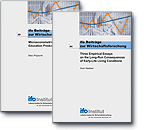
 |
| Issue 1/2016 |
|
The Ifo Center for the Economics of Education is a research department of the Ifo Institute that covers topics in the economics of education. How does education affect long-run prosperity and equality of opportunity? How can we improve our education systems? These are the questions that a team of 16 staff members pursues under the direction of Prof. Dr. Ludger Woessmann. Last summer, the Center published its first Newsletter in German, which we now – somewhat belatedly – also proudly present in English. In the future, the Newsletter will regularly inform about our latest research results. Please feel free to forward the Newsletter to interested education decision-makers in your country!
|
Recent Research Topics |
The Knowledge Capital of NationsThe long-term growth of economies directly depends on the skills of the people – the “knowledge capital” of nations. Economic policy that aims at long-term prosperity must therefore primarily focus on improving the education of the population. This is the conclusion Ludger Woessmann, head of the Ifo Center for the Economics of Education, and Ifo research professor Eric Hanushek, Stanford University, reach in their latest book, The Knowledge Capital of Nations, which was published by MIT Press last summer. According to Daron Acemoglu, it is a “thought-provoking book”. more... |

|
Development Goal: Universal Basic SkillsLast fall, the United Nations defined the Sustainable Development Goals that are to follow on the previous Millennium Development Goals. Based on the findings of their new book, Eric Hanushek and Ludger Woessmann, in a new study published by the OECD, argue that the primary development goal of the post-2015 agenda should be that all youth achieve at least a basic level of skills. The importance of such a goal for inclusive world development would be immense. more... |

|
PIAAC: Returns to Skills on the Labor MarketNot only the economy at large, but also individuals benefit from improved educational achievement. To examine this more closely, Simon Wiederhold and Ludger Woessmann from the Ifo Center for the Economics of Education together with Ifo research professors Eric Hanushek, Stanford University, and Guido Schwerdt, University of Konstanz, use data from the PIAAC adult achievement test. In their study, published in the European Economic Review, they show that higher skills pay off on the labor market of all 23 participating countries: an increase by one (out of five) skill levels is associated with 18 percent higher earnings on average. more... |

|
Skilled Teachers Important for Student PerformanceThe cognitive skills of teachers are an important determinant of international differences in student performance in the PISA test. This is the conclusion reached by Marc Piopiunik and Simon Wiederhold from the Ifo Center for the Economics of Education together with Ifo research professor Eric Hanushek in a recent study in which they combine the skill measures for teachers from the PIAAC study with individual student data from the PISA test. more... |

|
Computers in the Classroom: Positive and Negative EffectsOn average, the use of computers in the classroom does not lead to better student achievement in math and science. However, some opposing effects are hidden behind this average result. If computers are used to look up information and to search for ideas, student achievement improves. But if computers are used to practice skills, student achievement declines. This is the result of a new study by Oliver Falck, Constantin Mang and Ludger Woessmann based on data of more than 400,000 students from more than 50 countries in the TIMSS international student achievement test. more... |

|
Ph.D. Thesis Evaluates Education PoliciesIn his Ph.D. thesis written at the Ifo Center for the Economics of Education and accepted by the Ludwig Maximilians University of Munich, Benedikt Siegler examines the effects of three educational policies. Did the university expansion in the 1960s and 1970s increase university access for the local population? How did the Bologna reform impact German universities in terms of student mobility, satisfaction, dropout, and other outcomes? Did the provision of private school vouchers for students in poorly performing public schools in Florida play a role in how the accountability system impacts student performance? more... |

|
| Back to top | |
A European Perspective: EENEE | |
|
The Ifo Center for the Economics of Education coordinates the European Expert Network on Economics of Education (EENEE). On behalf of the European Commission, EENEE regularly writes Analytical Reports on policy-relevant topics in the economics of education. In addition, two-page EENEE Policy Briefs cast spotlights on important research results in key policy debates:
5/2014: Ludger Woessmann: The Economic Case for Education (based on EENEE Analytical Report No. 20) |

|
|
1/2015: Mirjam Strupler Leiser and Stefan C. Wolter: Public Procurement Can Promote Apprenticeships 2/2015: Jo Blanden and Sandra McNally: Helping Poor Kids: Effective Policies to Reduce Educational Inequalities (based on EENEE Analytical Report No. 21) | |
| Back to top | |
In the English News | |
More in School, but Not LearningThe New York Times reports on the new study by Eric Hanushek and Ludger Woessmann on the economic returns of a goal of universal basic skills. more... | |
|
The BBC has published an article with interactive world maps on the same study.
more... | |
Universal Basic SkillsIn a guest commentary for The Conversation, Eric Hanushek and Ludger Woessmann argue that universal basic skills should be the primary international development goal of the post-2015 agenda. more... | |
Is a Nation's Prosperity Linked to the Skills of its Population?Two radio contributions by Ludger Woessmann on Share Radio and on BBC Radio Gloucestershire. | |
In the German News | |
Knowledge and Prosperity of NationsIn an article in the Frankfurter Allgemeine Zeitung, Ludger Woessmann writes on the contribution of knowledge to economic growth and prosperity. more (in German)... | |
Universal Basic Skills as an Effective Development GoalThe online edition of the Neue Zürcher Zeitung has included the article by Eric Hanushek and Ludger Woessmann on the development goal of universal basic skills in its selection of “Economic Voices of the Month”. more (in German)... |
|
Computer-based Learning not Automatically Better than Pen and PaperIn an interview in Magazin Schule, Ludger Woessmann reports on new research results on the use of computers in the classroom. more (in German)... | |
Attracting Youths to Vocational EducationLudger Woessmann in an interview for Deutschlandfunk on the OECD Skills Outlook. more (in German)... | |
The School of OpportunitiesIn an interview in the magazine Einsichten of the Ludwig Maximilians University of Munich, Ludger Woessmann demonstrates how an education system can be both performance oriented and open to all. more (in German)... | |
| Back to top | |
Selected Events | |
Education Policy Forum of the Leibniz Education Research NetworkThe Educational Policy Forum 2015 of the Leibniz Education Research Network (LERN), for which Ludger Woessmann planned the program, took place in Berlin on the topic “Acceptance and Feasibility of Educational Reform: How We Can Exploit Educational Potentials”. more... |
 |
40 Years of the Committee on the Economics of EducationAs its chairman, Ludger Woessmann organized the 2015 annual meeting of the Committee on the Economics of Education of the German Economic Association (Verein für Socialpolitik) in Berlin on “40 Years of the Committee on the Economics of Education: Developments and Perspectives”. more (in German)... |
|
Public Opinion and the Political Economy of EducationIn May 2015, the Ifo Center for the Economics of Education, together with the Program on Education Policy and Governance at Harvard University, organized a workshop on “Public Opinion and the Political Economy of Education”. more... |

|
| Back to top | |
Recent Publications |
MonographsEric A. Hanushek and Ludger Woessmann, The Knowledge Capital of Nations: Education and the Economics of Growth. Cambridge, MA: MIT Press, 2015.Eric A. Hanushek and Ludger Woessmann, Universal Basic Skills: What Countries Stand to Gain. Paris: Organisation for Economic Co-operation and Development, 2015. Benedikt Siegler, Microeconometric Evaluations of Education Policies, ifo Beiträge zur Wirtschaftsforschung 57, Munich: Ifo Institute, 2015. |
Articles in Refereed JournalsSilvia Angerer, Daniela Glätzle-Rützler, Philipp Lergetporer and Matthias Sutter, "Donations, Risk Attitudes and Time Preferences: A Study on Altruism in Primary School Children", Journal of Economic Behavior and Organization 115: 67-74, 2015.Stefan Bauernschuster, Oliver Falck and Ludger Woessmann, "Surfing Alone? The Internet and Social Capital: Evidence from an Unforeseeable Technological Mistake", Journal of Public Economics 117: 73-89, 2014. Oliver Falck, Stephan Heblich and Robert Gold, "E-lections: Voting Behavior and the Internet", American Economic Review 104(7): 2238-2265, 2014. Eric A. Hanushek, Guido Schwerdt, Simon Wiederhold and Ludger Woessmann, "Returns to Skills around the World: Evidence from PIAAC", European Economic Review 73: 103-130, 2015. Erik Hornung, "Immigration and the Diffusion of Technology: The Huguenot Diaspora in Prussia", American Economic Review 104(1): 84-122, 2014. Philipp Lergetporer, Silvia Angerer, Daniela Glätzle-Rützler and Matthias Sutter, "Third Party Punishment Increases Cooperation in Children through (Misaligned) Expectations and Conditional Cooperation", Proceedings of the National Academy of Sciences 111(19): 6916-6921, 2014. Philipp Lergetporer and Daniela Glätzle-Rützler, "Lying and Age: An Experimental Study", Journal of Economic Psychology 46: 12-25, 2015. Anja Perry, Simon Wiederhold and Daniela Ackermann-Piek, "How Can Skill Mismatch Be Measured? New Approaches with PIAAC", Methods Data Analyses – Journal for Quantitative Methods and Survey Methodology 8(2): 135-172, 2014. Marc Piopiunik, "Intergenerational Transmission of Education and Mediating Channels: Evidence from a Compulsory Schooling Reform in Germany", Scandinavian Journal of Economics 116(3): 878-907, 2014. Marc Piopiunik, "The Effects of Early Tracking on Student Performance: Evidence from a School Reform in Bavaria", Economics of Education Review 42: 12-33, 2014. Ludger Woessmann, "An International Look at the Single-Parent Family", Education Next 15(2): 42-49, 2015. |
Working PapersSascha O. Becker and Ludger Woessmann, "Social Cohesion, Religious Beliefs, and the Effect of Protestantism on Suicide", CESifo Working Paper No. 5288, March 2015.Oliver Falck, Constantin Mang and Ludger Woessmann, "Virtually No Effect? Different Uses of Classroom Computers and their Effect on Student Achievement", CESifo Working Paper No. 5266, March 2015. Eric A. Hanushek, Marc Piopiunik and Simon Wiederhold, "The Value of Smarter Teachers: International Evidence on Teacher Cognitive Skills and Student Performance", CESifo Working Paper No. 5120, December 2014. Philipp Lergetporer, Silvia Angerer, Daniela Glätzle-Rützler and Matthias Sutter, "Cooperation and Discrimination within and across Language Borders: Evidence from Children in a Bilingual City", Ifo Working Paper No. 200, 2015. Marc Piopiunik and Jens Ruhose, "Immigration, Regional Conditions, and Crime: Evidence from an Allocation Policy in Germany", CESifo Working Paper No. 5303, April 2015. Jens Ruhose, Oliver Falck and Alfred Lameli, "Cultural Biases in Migration: Estimating Non-Monetary Migration Costs", IZA Discussion Paper No. 8922, 2015. Jens Ruhose and Guido Schwerdt, "Does Early Educational Tracking Increase Migrant-Native Achievement Gaps? Differences-in-Differences Evidence across Countries", CESifo Working Paper No. 5248, March 2015. |
| Back to top |
Imprint | |
|
The Newsletter of the Ifo Center for the Economics of Education is a free e-mail service which informs about new research results, publications, events, and more from the Ifo Center for the Economics of Education. Subscribe | Unsubscribe | Feedback Your data will be stored internally by the CESifo Group for dispatch of the Newsletter of the Ifo Center for the Economics of Education. It will be treated confidentially and will not be handed on to third parties. For more information see Privacy Policy. Please also visit the website of the Ifo Center for the Economics of Education. Or send us an e-mail at bildungsnews@ifo.de. Copyright © Ifo Institute 2016. Status: April 2016. Editor: Ifo Center for the Economics of Education, Ifo Institute – Leibniz Institute for Economic Research at the University of Munich, Poschingerstraße 5, 81679 Munich | |